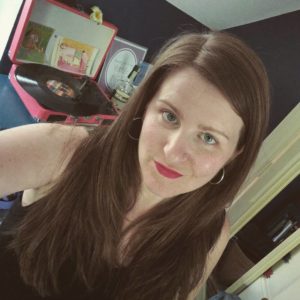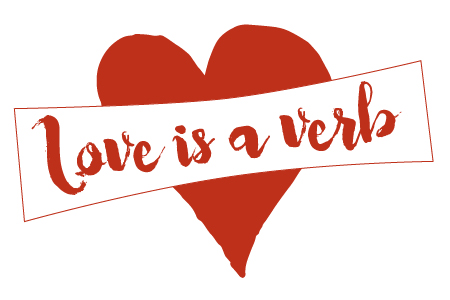 Meghan Florian is a writer from Durham, North Carolina, where she teaches at William Peace University and the Center for Theological Writing at Duke Divinity School. She is the Creative Writing Editor at The Other Journal, and blogs at www.femmonite.com.
Meghan Florian is a writer from Durham, North Carolina, where she teaches at William Peace University and the Center for Theological Writing at Duke Divinity School. She is the Creative Writing Editor at The Other Journal, and blogs at www.femmonite.com.
As I contemplate this phrase, “Love is a Verb,” I feel stuck. Stuck, because I wrote my master’s thesis on love. Stuck, because I grew up listening to DC Talk sing,
“Words come easy but don’t mean much / When the words they’re sayin’ we can’t put trust in / We’re talkin’ ’bout love in a different light / And if we all learn to love it would be just right.”
I’ve thought a lot, written a lot, sung a lot, about love. And would it? Would it all be “just right” if we learned to love?
After the massacre in Orlando, I scribbled out a love letter to my queer friends. But I didn’t send or publish it anywhere, because that felt like centering my own experience, my own fear – albeit fear for them, because of my love for them – and the last thing I could imagine doing at such a moment was centering myself.
For all the ways I feel like I don’t quite fit, for all the ways I struggle with gender and sexuality and the church, the fact remains that I live very much at the center. So I reached out in smaller ways, words and embraces and tears.
Yet I felt the attack on a deeply personal level, and I’ve been thinking a lot about why, about the difference between being an ally who aligns myself with someone else’s cause, and saying,
being an ally who aligns myself with someone else’s cause, and saying,
“Your cause is my cause, your needs are my needs, your life is bound up with mine.” I’ve been thinking about Ruth and Naomi: “Where you go, I will go; Where you lodge, I will lodge; your people shall be my people, and your God my God. Where you die, I will die — there will I be buried” (Ruth 1:16b-17a).
What I mean is, I don’t often think of myself as an ally; I think of myself as someone who wants to be with the people who love me.
I am lucky to be welcomed to the fringes of queer communities, safe spaces where I am a guest, where I experience life-giving, expansive love. I have learned how to be more fully myself because of the lives of friends who are so courageously themselves. I have learned to love because of courage my friends should not need, yet embody every day. It is contagious. It is a gift.
The language with which churches frame LGBTQ inclusion never sits right with me, insofar as it’s usually language that maintains an “us / them” distinction: Let “us” (the straight people) welcome “them” (the not-straight people). It’s “other” language, and more so, it’s language that erases LGBTQ Christians who are members of our churches already, whether closeted or out. It’s too easy to want a pat on the back for being welcoming, when in fact such declarations of welcome are only necessary because of the church’s previous rejection, implicit and explicit. An announcement of welcome is good, but it is only the beginning of repenting and repairing the damage the church has done.
This normative “we” forgets that queer people of faith have created communities of love and acceptance without it, communities that often do a better job of being church than “we” have – in bars, dance clubs, support groups, and informal gatherings of friends who become like family. And so the idea of a welcoming church can feel to me like a straight church that will let gay people attend, rather than a diverse community that we create together.
I want to be part of a community that isn’t limited by categorizing and boxing one another up, where we can fully inhabit and express our identities, where we can celebrate one another. This is the kind of community I experience with so many friends who have been rejected by the church throughout their lives, yet nonetheless have found ways to gather and worship, who include me in their lives of faith.
When I think about the phrase “love is a verb,” I can only be grateful for the love I receive every day from precisely those who would have every reason to reject my paltry efforts at being a so-called ally. I love my friends, it’s true, but even more so I see that they love me, which I can only assume is difficult to do.
At Chapel Hill Mennonite Fellowship, we’ve had a busy summer due to the repercussions of our pastor officiating the wedding of two women in our community. I have been grateful for the outpouring of support for our pastor from other Mennonite congregations, even as I lament harsh words and actions from others. When the flurry of viral news articles has passed, our community will go on with our lives, simply doing what is right, loving one another in all our varied identities, all our highs and lows, our needs, our desires, our loneliness and human longing.
Love is a verb, sure, but it is also a gratuitous, unearned, luxurious gift. Lord knows the church has not earned the love of queer Christians. When I show up to church each week I am grateful we’ve been given the opportunity to return the love we receive, and the trust our friends offer us when we gather together.
We’re like Peter, many of us. He denied Jesus three times, yet Jesus still loves him. Like Peter, we have denied Jesus’ presence in others’ lives three times and thousands more, and somehow, are looked on in love. That is a miracle. That is a grace. That is Jesus, God made flesh in the lives of my friends, the embodiment of love.


